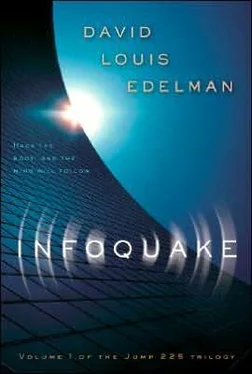He awoke the following Monday with a sense of determination he had not felt since before initiation. By 6:40 that morning, Natch was wading through the Omaha traffic towards the tube stations. He was no longer a curious bystander tossing pebbles at multi projections; now he had become part of the flow, a fish swimming upstream with the rest of the workforce. Natch caught a cross-town tube and found himself standing in Serr Vigal's foyer with three minutes to spare.
Vigal emerged from his bedroom fifteen minutes late, ushered Natch inside, and then spent another twenty-two minutes clucking around the kitchen making tea. The young programmer scanned the living room in vain for an extra workbench or a set of bio/logic programming bars. Where does he expect me to work? Natch thought.
Finally, he and his guardian sat on opposing couches and got down to business.
"The human brain," said Serr Vigal solemnly. A holograph of the bulbous organ appeared in the air between them. With an unassuming wave of his hand, Vigal enlarged the projection until it nearly filled the room, then set it rotating slowly in place. "And here"-his finger indicated the long trunk that extended out the bottom-"here is the area we specialize in: the brainstem.
"What is the brainstem? The brainstem is the key to understanding humanity. Learn how the brainstem works, and you learn how people work."
Vigal stood and began walking slowly around the hologram. His words had the flavor of a carefully scripted lecture.
"The body is a sensory machine," continued Vigal. "A machine that takes careful measurements of what is going on all around us. Sights, smells, sounds, tastes, touches: these are nothing more than dispatches from the outside world. The body transfers this information to the brain through a series of neural networks. And what does the brain receive? Meaningless pulses of electrical activity. Echoes of the world around us. How is the mind to make any sense of it at all? That is where the brainstem comes in.
"The brainstem is the connection between mind and body.
"The brainstem is the mechanism that translates impulse to thought, and then thought to action. It is the body's jumping-off point to higher intelligence. The brainstem passes information to the central processing units of our minds, the cerebrum and cerebellum. It translates this data into a format the higher brain can understand. And when the central processor has determined a course of action, it then routes electrical impulses back into the body through the brainstem.
"What would we be without the brainstem? Without the brainstem, the body would be a useless mass of tissue and bone. Our senses would be reduced to electrical impulses without context-mere random noise. And our minds? Our minds would be isolated from the real world. We would be free to postulate and theorize and deduce, but be forever unable to translate these lofty thoughts into action. We would each be remote stars in the center of a meaningless void.
"All the questions humanity has been asking itself since the dawn of time have their root in the brainstem. Are we creatures of passion, or are we creatures of forethought? How do we balance the needs of the mind with the needs of the body? Should Hamlet follow his heart and avenge the death of his father, or should he follow his head and, through careful reason, devise another course of action?
"These are brainstem questions, Natch. This is what you will be studying here in my memecorp over the next two years."
Natch's eyes began to glaze over halfway through Vigal's speech, and he wondered if this was part of the memecorp's standard fundraising pitch. Natch didn't want to be a philosopher; he wanted to be a programmer. He wanted to feel the grooved handle of a bio/logic programming bar in his hand as he stood in MindSpace making logical connections. He wanted to make things work.
But, over the next few months, Natch obediently buried himself in the lore of the brainstem. He read about the cell composition in the thalamus and hypothalamus, about the mysteries of the medulla oblongata, about the fiber pathways that ran through the limbic system like cranial tube tracks. He studied humanity's slow progress in mastering the brainstem through bio/logics. The early neural programmers began with simple programs to monitor the electrical pulses passing through the nervous system, and then later crafted programs to control them. Soon their successors were using bio/logics to broaden the bandwidth of the spinal cord, to shorten the refractory period a neural cell must wait between transmissions, to intercept and edit and mimic the electric messages passing through the nervous system. They learned how to plug straight into the message stream and project sensations of their own that were indistinguishable from their "real" counterparts.
During these first few months of his apprenticeship, Natch also learned the ins and outs of the memecorp business. He accompanied his guardian on a round of fundraising and speeches that took them from Omaha to Beijing to Melbourne and even out to the orbital colonies of Allowell and Nova Ceti. Vigal would begin with the same speech he had given Natch on his first day of apprenticeship, and then segue into lofty promises of future achievements. Accurate recording and playback of mental processes. Clustered brainpower. Group consciousness.
After the speeches, there would be private discussions with the men and women who ran the local programming services departments. Vigal would nod and listen earnestly to their ideas for hours on end, and more often than not end the day receiving a pledge of capital or the offer of a group subscription contract. Natch had always thought most bio/logic programs were sold directly to consumers on the Data Sea; now he discovered three-quarters of the code that ran human systems was "channeled" silently through deals with L-PRACGs and creeds and other organizations.
As Natch learned all this, he also learned about Serr Vigal.
Vigal's professional life had always been an enigma to Natch. He had spent more than thirty years right here at the same memecorp, doing the same work. His products often didn't even have names; instead, they were identified by long, dreary strings of numbers. He had the respect of his colleagues and apprentices, but virtually no social life. If he had ever taken a companion or a lover in the years since Lora's death, he kept it well hidden.
The more Natch learned about Vigal, the more of a mystery the man became. Natch had always dreamed about creating the kinds of programs that inspired raves from Primo's, programs that sparked social revolutions like Sheldon Surina's had. He would have never guessed that his own legal guardian had been doing that for years. In their own quiet way, Vigal's programs had probably influenced the world more than all of Figaro Fi's clientele put together.
But eventually, Natch grew restless. He wanted to stop analyzing and start doing.
Month after month, he buried himself in his studies. He had barely met his fellow apprentices at the memecorp and never even been given a workbench. While Vigal had him cooped up in his apartment studying the intricacies of the limbic system, Horvil and the rest of the boys returned from initiation. Soon Horvil had set up shop near his family's London manor and started building a reputation as a topnotch ROD coder. Other acquaintances from the hive were savoring their first mentions in Primo's.
"How long until I start programming?" Natch snapped to Vigal one day, a little over a year into his apprenticeship. "I haven't set foot into MindSpace since I got here. If you expect me to learn the whole discipline of neurophysics before I pick up a programming bar, that could take years."
Vigal simply smiled that maddening smile of his and shook his head. "I've been studying the brainstem for almost forty years, Natch, and I'm not even close to understanding the whole discipline of neurophysics. You are learning no more than the essentials you need to do your job."
Читать дальше






![David Jagusson - Fesselspiele mit Meister David [Hardcore BDSM]](/books/486693/david-jagusson-fesselspiele-mit-meister-david-har-thumb.webp)





